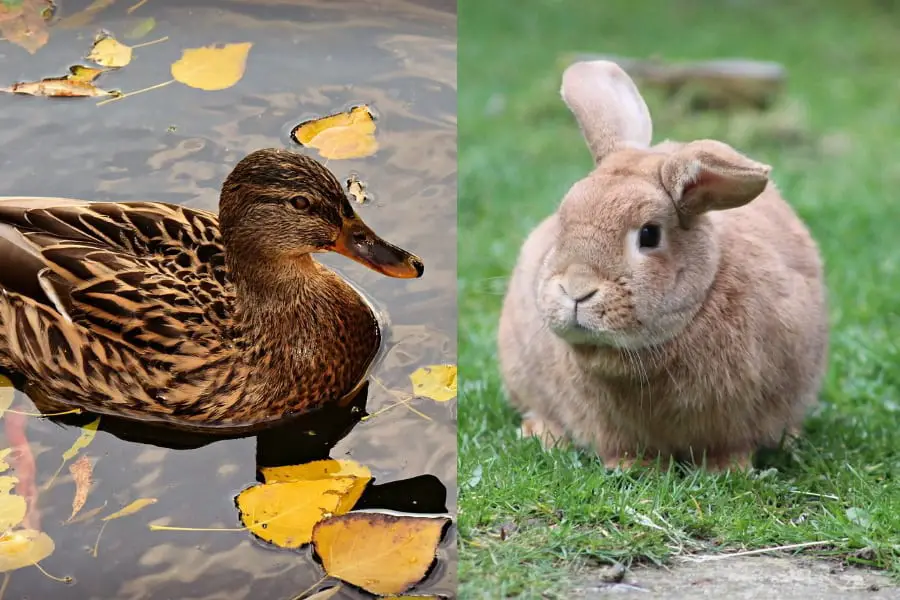
We all love a good “opposites attract” story with cute animals who become unlikely pals. If you have ducks and rabbits but have always kept them separate, you may wonder if you could bring them together for the next viral sensation. A duck and a rabbit living harmoniously would be ridiculously cute, but is it a good idea?
Can ducks live with rabbits? Ducks and rabbits will not be the ideal housemates. Their needs are quite opposite, making their living environments different. They can also get testy with each other due to different characteristics. If you want to have them cohabitate, introducing them when they are young can help make it possible.
Whether you are an experienced farmer or just starting to take in new animals at your home, it’s important to understand not only how specific animals operate and their needs, but also how they interact with others around them.
Why Ducks and Rabbits Aren’t the Perfect Pair
When you consider the different types of animals you would like to have at home, you need to look at every different variable. Their health and safety should always come first.
To keep them safe includes protecting them against wild predators outside of your home or farm, but it can also mean separating certain types of animals from each other.
Learning more about the individual animals first will help you decide the best course of action. Here are a few quick facts about each that will help us better understand why these two animals aren’t the best pals to put together.
Duck Traits and Facts
- There are over 100 different species of ducks, with 12 common types. Identifying and understanding what type of ducks you have will help determine everything from the conditions they need to their diet and how they will interact with others.
- They are found in saltwater and freshwater habitats and always need a source of water nearby in their habitat.
- There are diving and dabbling ducks – divers will submerge themselves and dive for their food whereas dabblers will acquire their food just beneath the surface of the water.
Rabbit Traits and Facts
- The American Rabbit Breeders Society recognizes 49 rabbit breeds.
- They are herbivores, living on an entirely plant-based diet.
- They are land animals found in woods, forests, meadows, and desserts. But domesticated rabbits require a regulated environment to fight off hypothermia or heat exhaustion.
Health Risks of Keeping Ducks and Rabbits Together
Aside from the differences, you can see in their most basic traits and characteristics that there is also a health concern when trying to have these two live together.
- Ducks produce a high amount of wet feces that can carry bacteria harmful to rabbits. When they are cohabitating in close quarters, this can become a significant concern.
- If the ducks and rabbits are both fully domesticated and eat food you put down for them, it can cause upset stomachs for both. Their food will seem appealing to each animal. But like any other animal, certain types of food won’t sit well, and their stomach gets used to their specific diet.
- Rabbits may miss out on some of the fresh grass and hay they love to snack on and gain lots of nutrients from, because of ducks. Ducks are not shy around a patch of grass or hay if they need to relieve themselves. If your ducks are messing up all the grass and haystacks around your rabbits, it will limit their nutrient sources aside from any pellets you may feed them.
Environmental Differences
A significant difference between these two animals and their environments is the need for water. While ducks don’t solely live in water, they do need it as part of their habitat. A body of water can be problematic for rabbits. They are land animals, and while they are capable of swimming, it is not an inherent skill they possess.
You can easily set up areas for each animal that are separated from one another and give them their own space. You mainly want to avoid having them housed together or in areas that are right on top of each other.
Characteristic Differences
Rabbits are feisty. As small bunnies, they are sweet and docile but can have an added touch of sass, especially as they grow into adults. Their sassiness can pose a problem when you try to mix them with other animals.
Rabbits tend to be low on the food chain. Because of that, their instinct is to protect themselves from possible predators. Rabbits will typically view any birds as predators. For them, it isn’t always easy to differentiate between a harmless duck or a predatorial hawk.
This is one of the main reasons rabbits will get feisty with ducks. They aren’t sure whether they will need to defend themselves. This will cause stress over time and can eventually lead to the rabbit attacking the duck.
Ducks may also go after rabbits if they feel threatened. While this scenario is less likely, it is still possible. Ducks tend to be more subdued in their defenses and are not known as aggressive animals. They will typically try to chase anyone away before becoming violent in any way.
Rabbits have a bit more of a hair-trigger (or hare-trigger, if you prefer) when it comes to feeling threatened. They are quick to react, and they are used to staying vigilant.
Something as simple as a duck sneaking up on a rabbit from behind with no ill-intent could startle a rabbit enough to the point of feeling the need to attack.
How to Introduce a Baby Rabbit to a Baby Duck
If you decide you would like to try and have them cohabitate, it’s not unheard of. But it may take some extra time, preparation, and research to be sure you have them set up in a safe and healthy atmosphere.
Once they get a bit older, they will most likely need to be separated in their actual living arrangements. But as babies, they are more open and accepting of other animals. Through their eyes, everything is new.
So, while an adult rabbit may see a duck and think it is a hawk about to swoop in for a kill, a baby rabbit will just see another baby–a bizarre-looking baby with a funny nose and no ears – but still, a baby.
Their environments and health concerns remain the same, though. So be very careful with bunnies around open water and be sure to keep them separated from any areas that the ducks are relieving themselves in.
If you teach them to be accepting of one another as babies, their temperaments will be more likely to work with each other, and they may be able to form a bond. Their bond will help keep them civil with each other and not aggressive. At the end of the day, they are still different animals with different needs.
And the most important tip of all, when you introduce a baby duckling and a baby bunny is to film it and share it for everyone to see the overwhelming cuteness.
Ducks and Rabbits Living Together
Even though they don’t make the best housemates and can be a danger to one another in different ways, you can still have both ducks and rabbits.
Make sure each of their environments is suited to them, and no apparent dangers are surrounding them. When animals are stressed out by something, it can negatively affect their health over time, while they will also become more defensive around different animals. So, ensure they are happy and healthy by keeping their areas specific to them and their needs.

